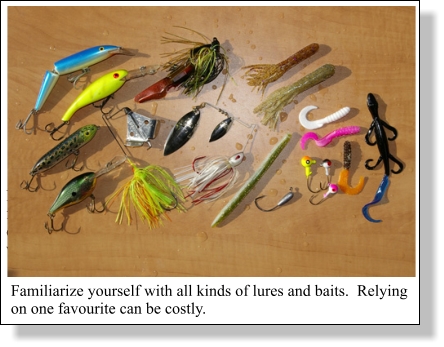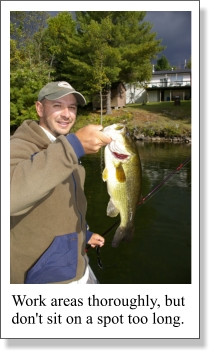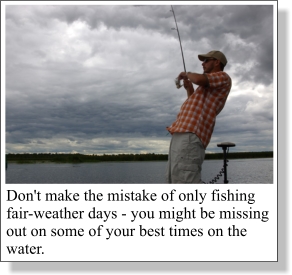The
Mistakes an Angler Makes Mistakes on the water can be a deal breaker when it comes to putting fish in the boat. Whether we subconsciously commit these errors, or tow the bad habits to the launch ramp each time out, they will become a detriment to your angling success. Recognizing our mistakes and how to overcome them will put you back in the drivers seat, leading to more fulfilling days and a significant increase in that bend of the rod. Relying on Confidence
Baits Confidence in "other" baits can only come about by using them, and the best way to accomplish this is by trying at least one different lure each time you hit the lake. Before long you will gain confidence and success with all of your baits, leading to more fruitful days on the water. (Besides, if there were only one magic lure, tackle store shelves would appear pretty lonely.)
Inclement weather, in the form of rain, wind or clouds, will often turn fish on, leading to feeding windows and better-than-average bites. This holds extremely true for walleye, as well as muskie, pike and smallmouth. Although your comfort levels may be lowered, your chance at better than average fish can go up when the weather gets slightly ugly. (Let me point out, however, that if it is unsafe to venture on the water, please don't do so. Safety always comes first.) For weekend anglers - those that only have a limited window to wet their line - heading out on those "uncomfortable" days is mandatory. You may not come home with a tan, but you might bring a trophy of a lifetime with you. Sit and Wait Although certain species do require a sit and wait approach (think catfish or carp), working a small area over too long a period can often lead to empty livewells and a lack of hooksets. When it comes to predatory fish (bass, pike, walleye, muskie), I will work an area over for 15 to 20 minutes before moving on. Now, if it routinely coughs up fish, I may return later in the day to see if the fish have moved up or turned on. Covering water is the name of the game when catching fish. The more fish that make visual contact with your presentation, the better the likelihood that they will take the bait. So the next time you drop that anchor or sit on a spot, be sure to look for greener pastures when the action fails to come to you. Preparedness and
Concentration Concentration is also key to catching more fish. Make each cast count, work the bait to your utmost capacity on every retrieve and be ready for when that big fish strikes. Trophy fish are a rare breed, so think of each cast as "the one", and you'll lessen the chance of losing her when she finally decides to come out and play. Mistakes in fishing are common, but learning to identify them while strengthening your approach, will lead to better days on the angling horizon…and what's not to love about that.
|



 Fishing
the Same Spots
Fishing
the Same Spots The
Fair-Weather Curse
The
Fair-Weather Curse